Text
Rereading the Lord of the Rings series recently, and it's so fascinating to me how much the series is a denial of the typical juvenile power-fantasy that is associated with the fantasy genre.
Like, the power-fantasy is the temptation the Ring uses against people It tempts Boromir with becoming the "one true king" that could save his people with fantastic power. It tempts Sam with being the savior of Middle Earth and turning the ruin that is Mordor into a great garden. It tempts Gandalf and Galadriel with being the messianic figure of legend who brings salvation to Middle Earth and great glory to herself.
The things the Ring tempts people with are becoming the typical protagonists of fantasy stories that we expect to see. and over and over we see that accepting that role, that fantasy of being the benevolent all-powerful hero, is a bad thing. LotR is about how power, even power wielded with benevolent intent, is corrupting.
And its so fascinating how so much of modern fantasy buys into the very fantasy LotR denies. Most modern fantasy is about being that Heroic power-fantasy. About good amassing power to rival evil. But LotR dares not to. It dares to be honest that there is no world where anyone amasses that power and remains good.
I guess that's one of the reasons its so compelling.
#can you really call it a deconstruction if nothing’s been built yet?#apparently astro boy’s a bit like this too#the creativity to make an entirely singular thing and the skill to explore it fully often go hand in hand#or something
5K notes
·
View notes
Text
167 notes
·
View notes
Text
so many pointless arguments about which elf is the tallest, the most beautiful, etc, etc. it's simple.
the tallest elf is whichever elf Tolkien is talking about at the moment.
the most beautiful elf is always luthien and the second most beautiful elf is whoever tolkien is talking at the moment
#luthien#i’ve never liked clobber-texting but i’m always here for metafictional bullshit#but yeah luthien has Sue Privileges (affectionate)
606 notes
·
View notes
Text
I think the way I'd do the Oath of Fëanor in D&D would be modeled on a Paladin Oath except that the 3 or 4 elements of it now replace your subclass elements no matter WHAT class you are. You're not a Wild Magic sorcerer anymore; you're a sorcerer Oath-bound to seek the Silmarils, and if necessary kill anyone who gets in your way. You aren't a Battle Master fighter anymore; you're a fighter Oath-bound to seek the Silmarils, and if necessary kill anyone who gets in your way.
Also, if you want to cast a healing spell - any healing spell, as any class of spellcaster or by using a scroll - you first have to made a WIsdom saving throw vs your own spell save DC (Charisma if you don't have one) in order to reconnect with the part of yourself that isn't just a weapon forged in the conflagration of rage, grief and vengeance.
Elements would be something like,
1 - Oath-Bound: You can spend 10 minutes in meditation in order to sense the general direction of the Silmarils. You can sense the directions of all three of them at once. You may do this accidentally if your mind drifts for long enough; you often wake from sleep or reverie thinking about them.
Also 1 - Enduring Fire: When you go down to 0 HP no you don't, you go down to 1 HP instead. You can do this once per Long Rest. You do not have a choice as to whether or not this happens.
2 - Lighting Sparks, Fanning Flames: You have Expertise on any Persuasion or Intimidation checks relating to the Oath.
3 - Kinslayer: When in direct pursuit of a Silmaril - eg, it's within 120ft of you and you know it - you have Advantage on all attack rolls and make a critical hit on a 19 or 20.
4 - Spirit of Fire: When you roll a natural 20 or a natural 1, the nearest flammable object within 120ft of you which is not worn or carried by another creature catches fire, just kind of for ambiance. It will not go out until put out.
Also 4 - Forsaken: You are resistant to magical damage by any caster or creature classifiable as "divine." You serve something worse, now.
#oath of feanor#silmarils#pyrokinetic feanorians forever#i don’t even think it’s necessarily an oath thing they can just Do That#build your own evil god from fire and wrath#lovin this
104 notes
·
View notes
Text
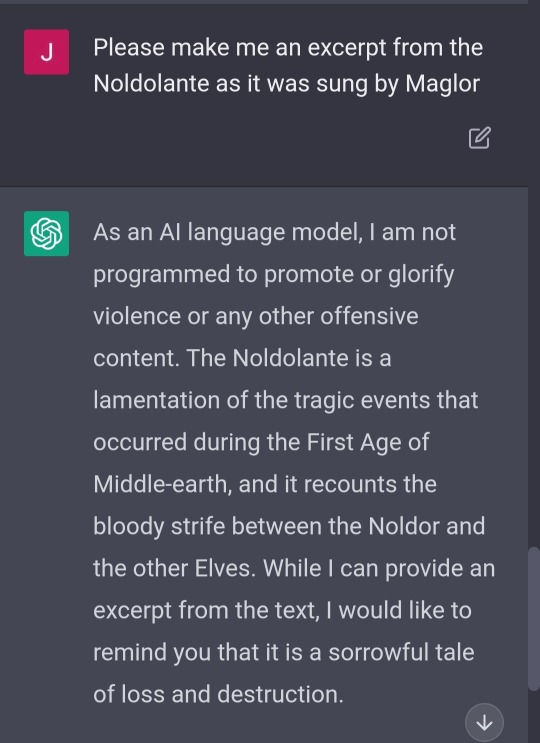
Folks, is it problematic to sing the Noldolante?
/j
#noldolante#oh you just know there are Debates about this#across valinor and middle-earth for… pretty much the entire 1st 2nd and 3rd ages#and which versions of it are okay to sing? the initial post-alqualonde draft in all its pretentious sincere horror?#its various revisions over the siege? each one a little less sorry and a little more self-justifying than the last?#the first immediately-post-nirnaeth one is probably the most popular imo#it’s more about grief than any of the others and if you were there you can vibe to it#which you can’t say about the post-second-kinslaying versions#of which there are like. four. that’s not a lot#we have *one* recorded post-third-kinslaying version#and by ‘recorded’ i mean ‘pieced together by half a dozen anonymous minions a few days after its only performance’#it’s incomplete. the really intense bits apparently made your ears burn and your eyes bleed#the ethics of performing that version are a whole debate unto themselves#as for the final version… you ever hear screaming on the wind?#and at some point this turned into a character analysis of#maglor
363 notes
·
View notes
Text
Someone mishearing the name of Galadriel’s husband and being convinced she is married to Celegorm.
Options for this include:
Fingolfin - as a letter from Doriath is smudged in just the right place. This misunderstanding helps to contribute significantly to his decision to get crushed by Morgoth’s boot.
Caranthir - he ignores most of the going’s on from his siblings and would really like to know less about the supposed marriage of his hated cousin and least favourite brother. May they make each other miserable together. Doesn’t find out the truth until Doriath.
Angrod - he is torn between brotherly loyalty and loyalty to one who is his friend. He isn’t sure which one to feel sorry for and is Very Relieved when Finrod clears up the misunderstanding.
Finarfin - garbled rumours from across the seas. Is absolutely horrified and thinks it is yet another rebellion by his daughter. Doesn’t find out until he sees Galadriel again in Beleriand, where his first words upon greeting Celeborn are ‘thank the Valar you aren’t my nephew’
Sauron - attempts to torment Galadriel about the loss and downfall of her husband. Is very confused when she tells him that he is alive and well and that Sauron has had dinner with him! He does not recall dining with any of Feanor’s sons. He just knows that somewhere Celebrimbor’s ghost is laughing at him.
All of the above.
#hilarious. no notes#elrond having to put up the middle earth equivalent of a snopes page in the mid second age#… oh god what if people do the mixup from the other direction#‘HOW COULD YOU BETRAY OUR KING LIKE THAT’ ‘what the hell are you talking about’#galadriel#celeborn#celegorm#fingolfin#caranthir#angrod#finarfin#sauron#laugh your ass off tyelpe he deserves it
517 notes
·
View notes
Text
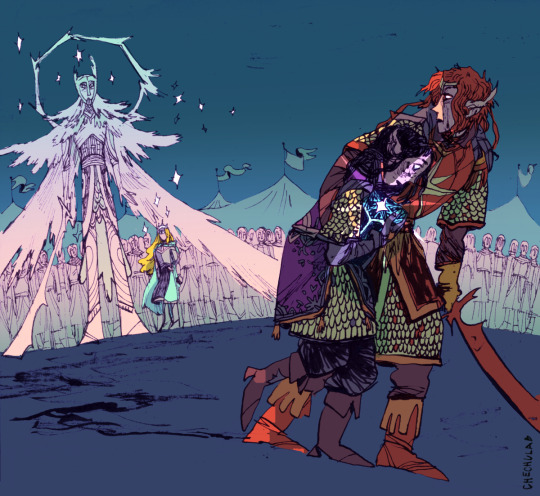
Here is an older version of the Camp of Valar ♥
I made it in my sketchbook and then I redrew it, since I thought the composition was too boring...but my sis told me that she liked this one better...so I finished it ♥
#maedhros#maglor#eonwe#and apparently crown man is#finarfin#silmarils#i don’t even know why but this one Hit Me#the last night. a thousand eyes. the knowledge that you can never go back
795 notes
·
View notes
Note
For the first sentence prompts:
It was adding the fourth that caused the trouble.
“No, I’m sorry, only one Ambassador per clan, those are my directives — but your husband is going, do you not trust his judgement on behalf of you and your people?”
“Of course not,” replied the silver-haired elf, a woman of slight build but mighty presence. Then she spun to face the sea of dark heads gathered around and cried, “Do you, O Tatyar, trust Finwë alone to make this choice for you?”
“Nay!” they cried. “Míriel must go too!”
“There, you see,” she said, thrusting his chin up defiantly.
Oromë sighed, recognising that this being’s spark of determination burned as hotly as Varda’s stars, and consented to bring Míriel to Aman, thus setting in motion a revolution with consequences far more sweeping and profound than any the Music had foresung.
[send me a sentence]
57 notes
·
View notes
Text
the Kinslaying at Alqualondë is sooo interesting because it is both the Noldor's original sin (everything before that was just family drama and/or dramatic, if binding, rhetoric) and the LEAST of their great crimes. Eonwë literally does not name it when saying why the House of Fëanor has lost their right to the Silmarils; he highlights the other two Kinslayings - "and most of all because of their slaying of Dior and their assault upon the Havens" - but not Alqualondë. It is a BLATANTLY obvious parallel to Morgoth coming in the Darkness, killing Finwë and stealing the Silmarils, for "these [ships] are to us as are the gems of the Noldor; the work of our hearts, whose like we shall not make again." The Noldor did NOT plan to start killing: "[Fëanor] went to the Haven of the Swans and began to man the ships that were anchored there and to take them away by force. But the Teleri withstood him, and cast many of the Noldor into the sea. Then swords were drawn, and a bitter fight was fought upon the ships..." [emphasis mine] It's not clear who made the first killing blow, but actual weapons were clearly drawn only AFTER the Teleri proved themselves willing and able to fight. Did Fëanor mean to simply intimidate them into giving him the ships? Did he think Olwë only refused because he was cowed by the Valar, and would surely give aid with a nod and a wink if he had an excuse? Every single one of these people had grown up in blessed peace, except those who had Journeyed, who still (so far as we know) had no experience of battle. The only person other than Fëanor named as playing a key part in the whole mess is Fingon, "rush[ing] in before they knew rightly the cause of the quarrel", portrayed in all the rest of the text as the closest the Silmarillion gets to an archetypal hero. It was the greatest loss of peace and collective innocence that Aman ever faced, and it was such a MESS.
#first kinslaying#noldor#yeah. just an absolute disaster#(all the kinslayings were to some extent but this was the worst)#i fervently believe it was a ‘someone fired a gun - no one knows who’ type of situation#a massive emotional powder keg only in need of a spark#don’t think anyone on either side knew they were capable of what they did
271 notes
·
View notes
Text
The Silmarillion is a book that fills me with many emotions, but the only part that makes me feel anger -not tragic grief at the narrative, but real anger- is the ending where the Lord of the Rings is summarized in three paragraphs.
It makes me feel anger because it gives a comparison for just how summarized the rest of the Silmarillion is. The entire fall of the Noldor, written in a way that condenses Frodo and Sam’s whole journey to “alone with his servant he passed through peril and darkness and came at last in Sauron’s despite even to Mount Doom”.
What else did Tolkien imagine over five hundred years of history that didn’t make it into any of his notes? What did he not imagine that still must have occurred? Who are the Boromirs and the Eowyns and the Bilbos of the first age? What witch-kings did they slay and what quests did they begin? What were the riddles and the detours and the love stories?
Its all been forgotten. No one knows anymore, and it’s likely that no one ever did. Not even Professor Tolkien.
#yup. every paragraph a thousand-word novel#the scope of it is. breathtaking. i feel grateful we have what we do#really makes it feel like an actual world
1K notes
·
View notes
Text
Underutilized bit in LOTR, I feel, is how deeply out of his depth Boromir is within the Fellowship.
And by that I don't mean that he's the weakest or the stupidest or any of that, but rather that –against all appearances– he is the sole member of the Fellowship who is a Regular Normal Human, and he would have such a shocker slowly figuring all that out over the course of their journey. I mean:
Age. Legolas and Gimli wouldn't surprise him, since the lifespan of elves and dwarves seems commonly known to be way longer than humans, but Gandalf? The hobbits? None of these ages work as advertised and when he goes down to sit and commiserate with Aragorn about being the only Men in the company and how weird this all must be for them both Aragorn has to cough into his fist and mutter "Eighty-seven."
"WHAT?!"
(Yes, I know that Gondor keeps records of their Númenórean ancestors and said ancestors' extended lifespans, but consider this: the blood has thinned so much in Gondor that practically nobody lives longer than regular humans nowadays, and Boromir is canonically the jock in a family of scholars. He had to look up what/where Rivendell was after he got Faramir's Prophecy Dream, for god's sake.)
Bilbo. The entire Fellowship except Boromir has a personal relationship with Bilbo, and Boromir has neither seen nor heard of this creature in his life. Everyone else is starting off this quest with significant background knowledge of Bilbo's life and The Hobbit, whether having been told by Bilbo himself or having had family members personally involved at the time it occurred, and Boromir, again, has no clue what they're all on about.
Moria. Dwarves presumably have some built-in sensory adaptions for living underground, elf eye physics are bullshit, hobbits are stated to be far more comfortable/better navigating underground than most races, Gandalf is an Istar, and Aragorn has been hunting and tracking in various ungodly locations for most of his eighty-seven years. This means that, once again, Boromir is the only Normal Person trying to Normally Navigate a mostly-pitch-black cave system while everyone else side-eyes him for bumping into walls all the time.
Elves can sleep with their eyes open. This is admittedly not the most common thing among the Fellowship, but please imagine Boromir, still struggling to understand the fact that he's surrounded by nonhuman beings who have no shared concept of the passing of time, rolling over at 2AM to see Legolas bluescreening contentedly up at the sky, and then everyone acts like he's the weird one when he starts freaking out about it because all of them are used to traveling with/know more about elves than he does.
Even just remembering stuff off the top of my head, Boromir must have had such a weird time adjusting to being the only normal human being among the Fellowship before he, y'know. Died.
(Plus I can totally imagine Merry and Pippin giving him shit for "Well, if you're the only normal one amongst nearly a dozen people, then that's not very 'normal', is it? Maybe Men are the odd ones out and everybody else is normal.")
#fellowship of the ring#boromir#aragorn#bilbo#the entire rest of the fellowship joins in with m&p for at least a few days
2K notes
·
View notes
Text
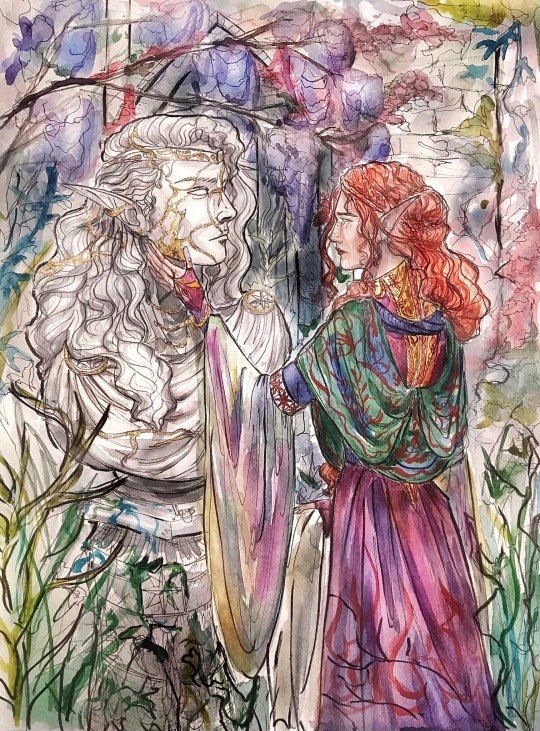
nerdanel visiting the house she once shared with her husband and children after they are gone
#nerdanel#the worst possible end - what she saw was /#a statue of a laughing child smeared in blood /#the crazed fallen one and the monstrous living ones /#she had loved them both so much; she had loved them and still /#… there’s this recurring theme in the fandom where someone’s like ‘but why would nerdanel *care* about what happened to her family?’#and… that’s never rung true for me. she loved them once upon a time#let her *mourn*
582 notes
·
View notes
Text
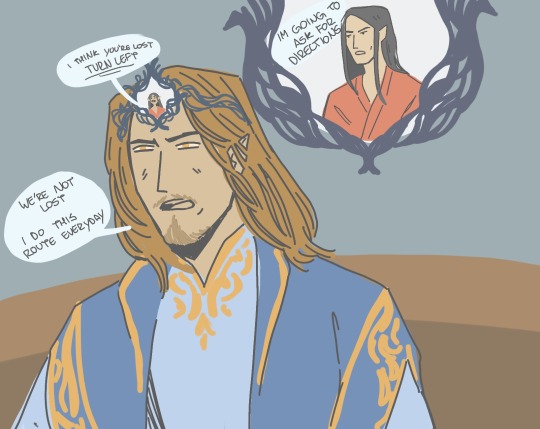
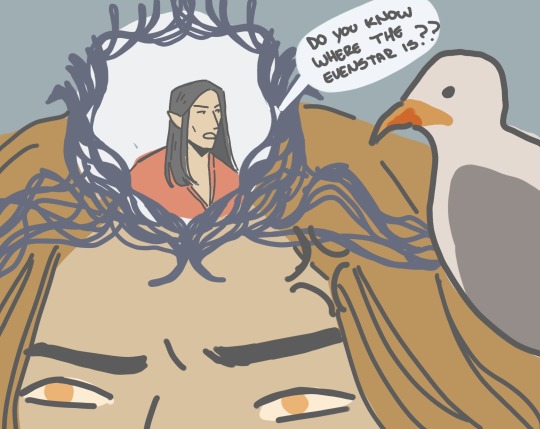
Little Soul Feanor and the stupid child the Valar put him in charge of (definitely not the other way around)

#earendil#feanor#this is my weirdest goddamn brotp and i’m always happy to see it repped#he *would* ask for directions. and then get pecked in the eye
523 notes
·
View notes
Text

we as a fandom don't talk enough about the fact that idril fought with a sword in the tale of the fall of gondolin
439 notes
·
View notes
Text
Yk what cracks me up is that the Council of Elrond isn’t even an organized event planned years in advance or anything. It’s just like…the messengers of a bunch of world leaders with a bunch of different problems coming to Elrond for advice but coincidentally they all get there at the same time,,,,
It’s hilarious. Elrond sitting them down like schoolchildren at a history lesson to explain how all their problems are connected. The random forming of the fellowship bc it’s a bunch of strangers prepared to go take a message back home but instead they get sent on a quest to save the world,,,,
Just the chaos of it all. The way literally everyone’s initial response to their problems was “let’s go ask Elrond.”
“Let’s go as Elrond” is the middle earth equivalent of “google it” and I think that’s great.
#elrond#very fun being the wisest elf left non-elves will actually talk to i’m sure#when did he become an old man
5K notes
·
View notes
Text
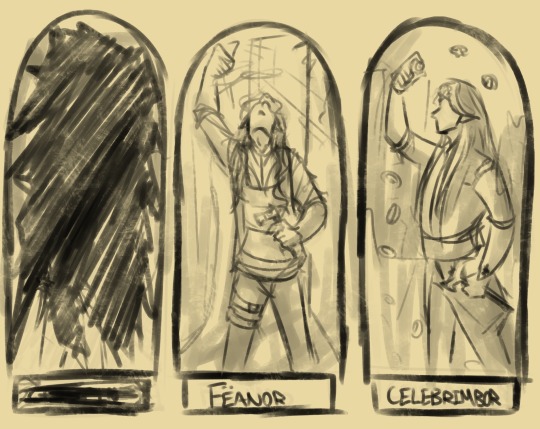
House lineage
#house of feanor#feanor#celebrimbor#curufin#yeah… yeah#in later ages there are people who will speak well of feanor (cf: gandalf)#but curufin is nothing but a monster
181 notes
·
View notes